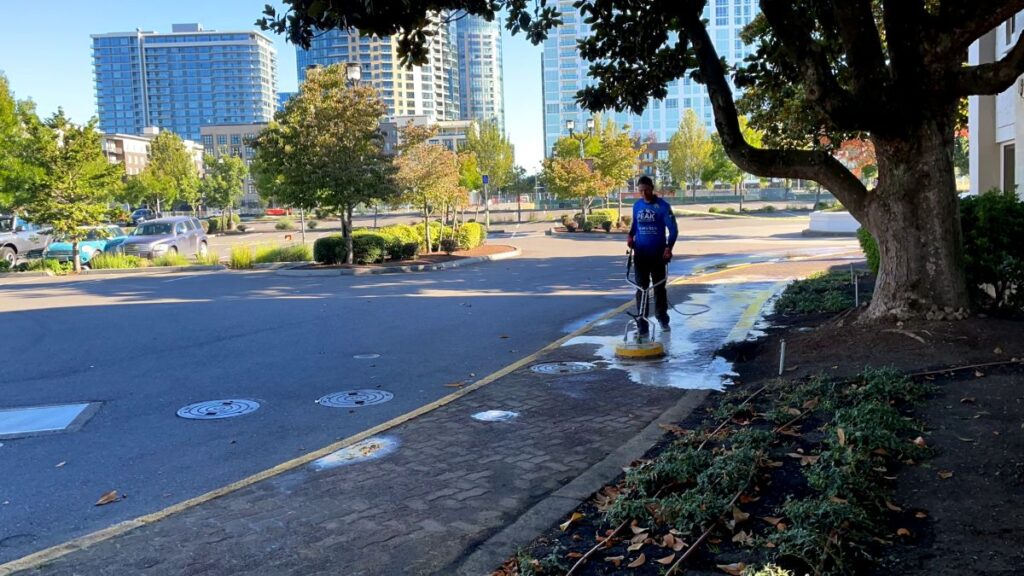Key Takeaways
- Sealing pavers protects against moisture, UV rays, weeds, and stains.
- Proper sanding supports joint stability and prevents shifting.
- Not all sealants are the same—choosing the right type matters.
- Weather and surface prep are crucial for success.
- Peak Pressure Washing offers professional paver sealing and sanding for long-term results.
Your driveway, patio, or walkway plays a huge role in first impressions. Paver installations can significantly elevate curb appeal, but without routine care, they quickly lose their visual and structural integrity. Sealing and sanding are two crucial components in maintaining not just the appearance but also the longevity of these surfaces.
Proper sealing shields your pavers from common enemies—UV damage, freeze-thaw cycles, moisture penetration, and staining. At the same time, joint sanding keeps the individual pavers locked in place, minimizing weed growth and structural shifting over time. When done right, these two practices help preserve your paver investment and make maintenance easier.
How Sealing Enhances Surface Durability and Appearance
Paver sealant acts as a barrier against water, oil, dirt, and the sun’s harmful rays. This protection reduces fading and discoloration and also prevents cracks and erosion caused by water seeping into the surface. For homes in Oregon, where rainy seasons are frequent, this added protection becomes especially critical.
Beyond protection, sealants can boost color vibrancy. A freshly sealed patio or driveway tends to look newer and cleaner. Many homeowners opt for sealants with a glossy or satin finish to amplify visual appeal, making the space feel more polished.
Benefits of Paver Sealing:
- Repels moisture, reducing the risk of cracking
- Minimizes moss and weed growth in joints
- Enhances color and finish
- Reduces surface stains from oil and organic debris
- Prolongs the life of the paver system
The Role of Joint Sanding in Paver Stability
Joint sanding is the process of filling the gaps between pavers with specialized sand to provide structural support. This sand helps keep pavers locked in place, preventing them from shifting, settling unevenly, or becoming dislodged.
Polymeric sand, a popular choice for modern applications, contains binding agents that harden when moistened, forming a tight seal between joints. This not only helps with stability but also deters weed growth and insect burrowing.
Why Joint Sanding Matters:
- Improves load distribution across the pavers
- Helps maintain level surfaces
- Reduces erosion and washout
- Discourages ants and weeds
Choosing the Right Sealant for Your Environment
Selecting the right sealant depends on multiple factors, including climate, paver material, and traffic levels. Oregon’s climate, known for its wet winters and fluctuating temperatures, demands a high-performance sealant.
Common Sealant Types:
- Water-Based Sealants – Low VOCs, easier cleanup, milder finish
- Solvent-Based Sealants – Higher durability, enhanced color depth, better water resistance
High-traffic areas such as driveways may benefit from solvent-based sealants due to their toughness, while patios and decorative areas might be fine with a water-based product that offers a more natural finish.
Surface Preparation: Where Many DIY Efforts Fail
Proper prep work is non-negotiable when it comes to paver sealing. Any dirt, moss, or grime left on the surface can interfere with adhesion, leading to uneven finishes or reduced effectiveness.
Basic Prep Steps:
- Clear the area of furniture, plants, and loose debris
- Power wash to remove deep-seated grime
- Allow surfaces to fully dry (typically 24–48 hours)
- Re-sand joints if necessary
Skipping these steps—especially drying time—can cause premature sealant failure or a cloudy, blotchy appearance.
Peak Pressure Washing uses professional-grade equipment and surface-safe cleaning agents to ensure your pavers are thoroughly prepared before sealing and sanding. This foundation ensures better, longer-lasting results.
Mistakes to Avoid with Paver Maintenance
Even well-intentioned efforts can lead to disappointing results if not handled properly. Here are common missteps to steer clear of:
- Skipping Surface Cleaning: Dirt and stains get trapped under sealant and become permanent.
- Sealing Wet Pavers: Moisture prevents proper curing and bonding.
- Using the Wrong Sealant: Not all products suit all paver types or environments.
- Over-Application: Applying too much sealant can cause bubbling or peeling.
- Neglecting Reapplication: Sealant wears over time—routine touch-ups are essential.
Why Hiring a Professional Is Worth It
While DIY kits are available, paver sealing and sanding are not beginner-friendly tasks. Inconsistent application, improper prep, or product mismatches can lead to poor outcomes or damage. Hiring a professional ensures the job is done with precision, using the right materials and techniques for your specific space.
Professionals also understand how to navigate tricky surfaces, weather timing, and specific joint conditions that might not be obvious to the untrained eye. By working with experts like Peak Pressure Washing, you gain peace of mind—and better, longer-lasting results.
Frequently Asked Questions
How often should pavers be sealed?
Every 2–3 years is ideal, though frequency can vary depending on exposure, traffic, and climate.
What happens if I don’t seal my pavers?
They may fade, shift, develop weed growth, and become vulnerable to moisture and stains.
Can I seal my pavers myself?
It’s possible, but not recommended. The margin for error is high, and improper sealing can lead to more problems than it prevents.
How long does the process take?
Depending on weather, size of the area, and drying times, sealing and sanding can take 1–2 days.
Do I need to reseal if I recently had sanding done?
Yes—sanding and sealing work best when done together, ensuring protection and joint stability.
A well-maintained paver surface doesn’t just look good—it functions better and lasts longer. For homeowners in Oregon, where rain and natural debris are frequent concerns, sealing and sanding are essential parts of outdoor upkeep.
Peak Pressure Washing offers professional-grade paver sealing and sanding that keeps your surfaces beautiful, safe, and built to last.

